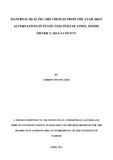| dc.description.abstract | This study explored maternal healthcare choices of expectant mothers in Nyang’oma Sub-Location, Bondo District. The objectives of the study were: the identification and description of maternal healthcare providers in the area; the examination of the determinants for maternal healthcare choices; and the exploration of the perceptions and attitudes of the local community towards both formal and informal maternal healthcare providers.
The study employed community survey for which 100 mothers with children below eight months were selected by simple random sampling. Key informant interviews involving twelve maternal healthcare providers, from popular, professional and folk sectors were also purposively sampled to shed light on services they provided to expectant mothers. The study also used focus group discussion of discussants, who were sampled by region in the area. Information on maternal healthcare providers in the area, the kind of maternal healthcare services they provide, social support system and the perception of the community towards maternal healthcare providers were collected guided by the Disease Explanatory Model (DEM) proposed by Kleinman (1980).
The findings indicate that various maternal healthcare providers such as biomedical, neighbours, friends, retired nurse, grandmothers, faith healers, traditional healers and traditional birth attendants exist in the study area. Expectant mothers use the services of these maternal healthcare providers but their use is influenced by distance to the facility and occupation, social support network, and belief in pregnancy. The study confirms that the perceptions and attitudes towards both informal and formal maternal healthcare providers affect the use of their services.
The study illustrates the important role played by all maternal healthcare providers in Nyang’oma Sub-location in addressing maternal healthcare problems. However, the low status accorded to the maternal healthcare in the popular and folk sector by the conventional medical practitioners may hinder efforts to improve maternal health. Any attempt to improve maternal health should consider the complementary roles of all maternal healthcare providers to realize safe motherhood. The harmony of the maternal health care providers may be realized by creating a sense of co-existence and realization that both are complimentary to each other. This can be achieved through training.
This study recommends that maternal health issues should be approached holistically, bearing in mind that traditional healers, traditional birth attendants, faith healers, mothers-in-law, friends, neighbours and biomedical health practitioners also play a role that may significantly reduce the high rate of maternal and infant mortalities. It should also be borne in mind that the factors influencing the use of these maternal health care providers should be appropriately addressed to facilitate improved maternal healthcare provision in the district and other parts of the country. | en_US |

